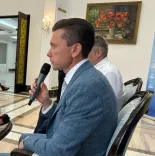Is the HIV Crisis in Fiji Growing with a Disturbing Surge in Child Infections and Fatalities?

Synopsis
Key Takeaways
- Alarming increase in HIV cases in Fiji.
- Surge in child infections with 41 cases reported in 2024.
- Significant government funding to combat HIV crisis.
- Need for innovative health systems to improve early diagnosis.
- Social issues like poverty and stigma complicate prevention efforts.
Suva, June 30 (NationPress) Serious concerns are escalating regarding the effects of HIV in Fiji, as eight children were part of the 126 people who succumbed to HIV-related illnesses last year.
The alarming statistics were presented by UNAIDS Pacific Adviser Renata Ram during the Fiji Medical Association's 2025 North Mini-Conference in Labasa, according to the Xinhua news agency.
Her remarks emphasized the urgent requirement for stronger, more accountable, and innovative health systems.
Ram depicted Fiji's HIV situation as deteriorating, making this year's conference theme -- Future-Proofing Healthcare Standards in Fiji: Accountability, Ethics and Innovation -- particularly relevant.
She disclosed that Fiji experienced its highest number of HIV diagnoses in 2024, recording 1,583 new cases. This represents an astounding 281 percent increase from 2023, which had 415 cases, and over a 500 percent rise compared to 2018, when only 131 cases were documented.
Among the 2024 cases, 1,542 were adults. More alarmingly, there were 41 cases among children, with 32 attributed to mother-to-child transmission. This is nearly four times the count of child infections in 2023, which reported only 11.
"These figures are not merely due to enhanced testing," Ram emphasized. "They signify a genuine surge in infections."
She pointed out that many individuals are diagnosed late, often when their illness has advanced—an evident indication that prevention, testing, and treatment services are not reaching people in a timely manner.
Ram cautioned that over half of the new infections are among young individuals, increasingly linked to injecting drug use and high-risk sexual behaviors—issues frequently concealed due to stigma and fear.
"This crisis transcends health concerns," she stated. "It unveils deeper societal issues like poverty, gender-based violence, and discrimination in accessing care."
Despite the disheartening statistics, Ram acknowledged the Fijian government's recent allocation of 10 million Fijian dollars to bolster the national HIV response, describing it as a bold and timely decision that reflects a robust political commitment to safeguard the health and dignity of all Fijians.
She further commended the Fiji Medical Association for its vital advocacy, particularly its early alerts and endeavors to push for the formal declaration of the HIV outbreak.
Ram raised specific concerns regarding the delayed health-seeking behavior in the Northern Division on Vanua Levu, where many individuals initially consult traditional medicine or postpone seeking medical assistance until symptoms worsen.
She urged the health sector to bridge the divide between traditional and modern medicine, advocating for innovative and respectful approaches to foster trust and reach vulnerable communities sooner.








